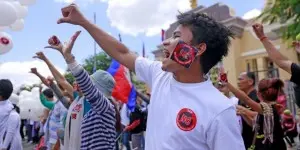
ASEAN Parliamentarians condemn passage of Cambodian NGO law
May 14, 2015

JAKARTA – The Cambodian National Assembly’s passage of the highly controversial Law on Associations and Non-governmental Organizations (LANGO) represents a grave threat to independent civil society and constitutes a failure of the ruling Cambodian People’s Party (CPP) to embrace a democratic, consultative approach to policymaking, ASEAN Parliamentarians for Human Rights (APHR) said today.
“The ruling party’s decision to ram this legislation through the National Assembly undermines the fundamentals of a multiparty democratic system,” said APHR Chairperson Charles Santiago, a member of parliament in Malaysia.
“Its parliamentary majority does not absolve the CPP of the need to listen to the views of opposition voices, as well as civil society. The ruling party failed to solicit or incorporate constructive input that could have improved this law and brought it into line with international human rights standards.”
The National Assembly approved the NGO law on Monday in a party-line vote. The law mandates that all civil society organizations (CSOs) register with the government and criminalizes activity by unregistered organizations. It also gives Cambodian authorities the power to disband CSOs and reject applications for registration on vague grounds, which could be used to target groups critical of the government.
“We fear that this legislation will be used to restrict independent civil society, particularly those groups that express opposition to the policies or politics of the ruling party,” said Son Chhay, APHR board member and an opposition parliamentarian from the Cambodian National Rescue Party (CNRP).
“While reasonable regulations would have been acceptable to pursue, this law goes much too far and violates Cambodia’s obligations under the International Covenant on Civil and Political Rights and the Universal Declaration of Human Rights.”
All 55 opposition lawmakers in the National Assembly boycotted the vote, as protesters amassed outside the parliament building in opposition to the law. The legislation now moves to the CPP-dominated Senate, where it expected to be approved and sent to King Norodom Sihamoni for signature and promulgation.
“This law is an affront to Cambodian civil society, which has been a critical force in rebuilding the country following years of turmoil and bloodshed,” Charles Santiago added.
“This NGO law undermines the ability of these groups to continue their important work and threatens the fundamental rights of all Cambodian citizens to freedom of association and expression.”
ASEAN Parliamentarians for Human Rights (APHR) was founded in June 2013 with the objective of promoting democracy and human rights across Southeast Asia. Our founding members include many of the region's most progressive Members of Parliament (MPs), with a proven track record of human rights advocacy work.